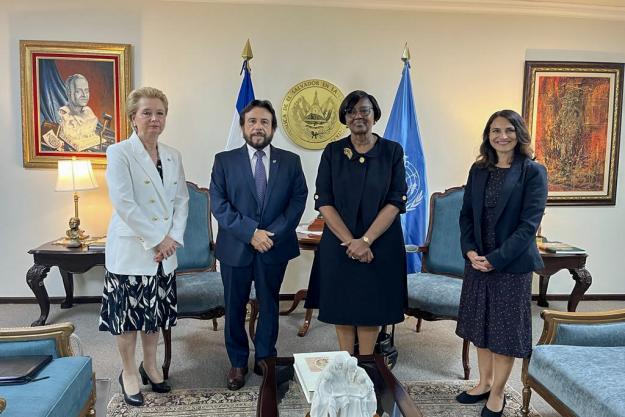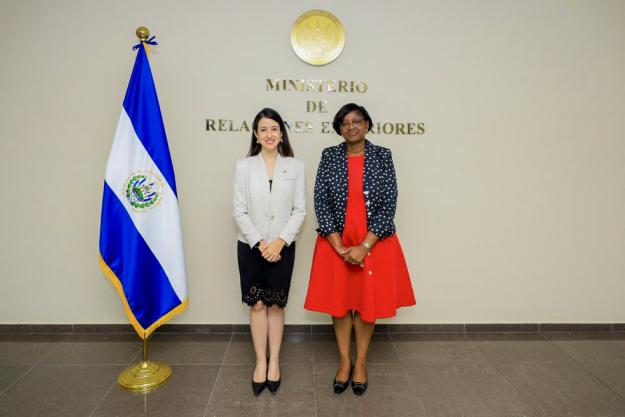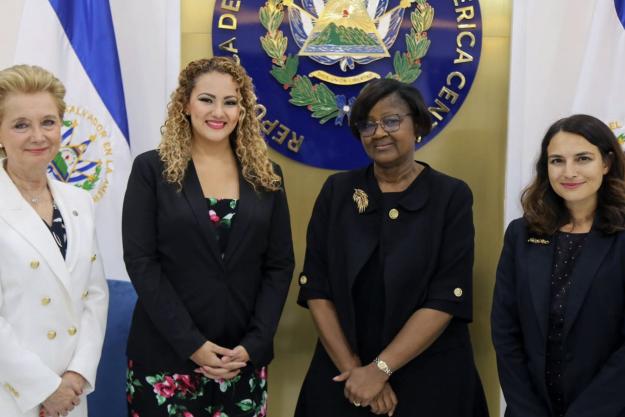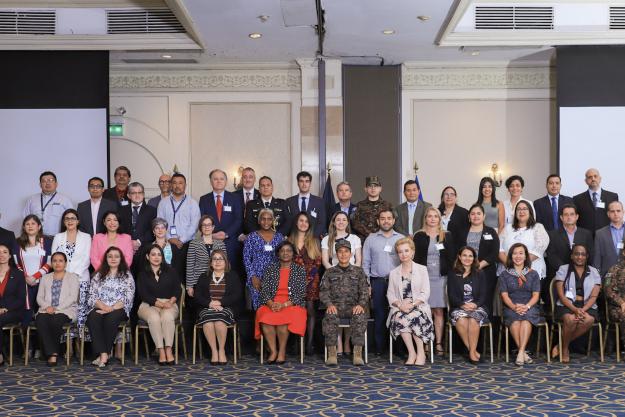
H.E. Ms Carmen Maria Gallardo, Permanent Representative of the Republic of El Salvador to the OPCW, H.E. Mr Felix Ulloa, Vice President of the Republic of El Salvador, H.E. Ambassador Odette Melono, OPCW Deputy Director-General, and Yasmin Naqvi, Special Advisor to the OPCW Deputy Director-General
THE HAGUE, Netherlands—19 October 2022—The Deputy Director-General of the Organisation for the Prohibition of Chemical Weapons (OPCW), Ambassador Odette Melono, travelled to the Republic of El Salvador from 25 to 27 September to meet senior officials in San Salvador and to promote the adoption of national legislation for implementing the Chemical Weapons Convention (CWC) to strengthen chemical security in the region. In addition to a series of high-level meetings, the Deputy Director-General participated in the launch of a workshop on national implementation of the CWC in Latin American and Caribbean OPCW Member States, and delivered a lecture at the Ministry of Foreign Affairs of El Salvador.
The Deputy Director-General met with high-ranking officials of the Republic of El Salvador including H.E. Dr Félix Ulloa, the Vice-President of the Republic of El Salvador and H.E. Counter Admiral René Francis Merino Monroy, Minister for Defense and Head of the National Authority of El Salvador. She briefed the Vice-President and Minister on the preparations for the Fifth Review Conference which will take place in May 2023 and the progress in the project to build an OPCW Centre for Chemistry and Technology (ChemTech Centre) which will become operational next year.

H.E. Ms Adriana Mira, Vice-Minister of Foreign Affairs, and H.E. Ambassador Odette Melono, OPCW Deputy Director-General
The Deputy Director-General also met with H.E. Ms Adriana Mira, Vice-Minister of Foreign Affairs; H.E. Congresswoman Ana Magdalena Figueroa Figueroa, President of the Commission of Foreign Affairs; and H.E. Congressman Juan Carlos Mendoza Portilla, President of the Commission of Defense. During these meetings, the Deputy Director-General welcomed a new El Salvadorian draft law implementing the Convention and urged its early adoption.
In her opening remarks at the inauguration of the ‘Regional Workshop on Best Practices in the Development of a Legislative and Regulatory Framework on Chemical Security’ in San Salvador, Ambassador Melono highlighted the critical role of national legislation to chemical security. She underscored: “Expanding national implementation of the Convention, especially with respect to chemical security, is our first and best line of defence against malicious use of toxic chemicals.” Fundamentally, chemical security regimes exist to protect populations by preventing the re-emergence of chemical weapons and mitigating the risk of the misuse of toxic industrial chemicals.
The workshop brought together technical experts and chemical industry professionals from Latin America and Caribbean countries to exchange knowledge and best practices on developing legal measures to uphold chemical security.
Participants discussed their approaches to assessing risks and gaps when developing legislation and their experiences in maintaining national control lists of chemicals with a security concern. “Considering that we have different national contexts, no single country can be considered as having the ideal legal framework. However, it can serve as reference for other countries seeking to develop our own national legal regimes. We appreciate forums such as this workshop that allow us to have information-sharing and learn from our peers”, said Ms. Aminta Diaz, Legal Advisor from the National Authority of Nicaragua, and one of the workshop participants.

H.E. Ms Carmen Maria Gallardo, Permanent Representative of the Republic of El Salvador to the OPCW, H.E. Congresswoman Ana Magdalena Figueroa Figueroa, President of the Commission of Foreign Affairs, H.E. Ambassador Odette Melono, OPCW Deputy Director-General, and Yasmin Naqvi, Special Advisor to the OPCW Deputy Director-General
Representatives of the OPCW’s Technical Secretariat delivered comprehensive lectures on implementing CWC-relevant legislation to address threats to chemical security, including by prohibiting and penalising illicit activities involving chemicals. Participants also heard case studies on the legislative development process, and learned more about the support offered by the Technical Secretariat to assist Member States in enhancing their chemical security regimes.
The workshop was attended by 44 participants from 17 OPCW Member States: Argentina, Barbados, Brazil, Chile, Colombia, Costa Rica, Cuba, El Salvador, Guatemala, Nicaragua, Panama, Paraguay, Peru, and Venezuela. Technical experts from Spain and the United Kingdom of Great Britain and Northern Ireland shared information on their respective national efforts in developing legal measures on chemical security.
During the visit to El Salvador, Ambassador Melono delivered a lecture to young diplomats on the contribution of the Chemical Weapons Convention to peace and security at the Dr José Gustavo Guerrero Diplomatic Institute of Ministry of Foreign Affairs of El Salvador. The Ambassador briefed Ministry officials, first responders and students on the status of the implementation of the CWC, the challenges and opportunities facing the Convention as the end of destruction of the world’s declared chemical weapons stockpile approaches, policy developments leading up to the Fifth Review Conference of the States Parties to the CWC (to be held in May 2023), and on the project to build an OPCW Centre for Chemistry and Technology.
On chemical security, Ambassador Melono stated: “The adoption and enforcement of legislation for implementing the Convention is an obligation and fundamental to preventing the re-emergence of chemical weapons.”
As of 1 July 2022, 158 States Parties (out of 193) had reported the adoption of national implementing legislation, out of which 118 had reported legislation covering all initial measures. In the Latin America and Caribbean Region, 17 States Parties have now adopted legislation covering all the initial measures required by the Convention.
Minister for Defense and Head of the National Authority of El Salvador, H.E. Counter Admiral René Francis Merino Monroy, remarked that “collaboration with the Organisation for the Prohibition of Chemical Weapons is without doubt the most important tool to prevent and eliminate the development, production, stockpiling and use of chemical weapons.”
The Deputy Director-General commended El Salvador for its “efforts at strengthening its legal framework on the Convention” and encouraged the country “to move forward with the adoption of the new draft law.”

Background
The course was conducted under Article VII of the Chemical Weapons Convention, National Implementation Measures, which mandates the Technical Secretariat to provide for international cooperation and assistance for States Parties to enact national implementing legislation.
Workshop participants identified a list of best practices including:
-
developing a national policy on the management of chemicals;
-
anticipating emerging threats, such as the development of ‘designer substances’, in order to anticipate necessary changes to existing legal regimes;
-
developing a comprehensive education and training strategy on chemical security, including the training of new industry personnel in order to install and maintain a chemical security culture;
-
developing an emergency preparedness and response framework that addresses attacks or incidents using chemical weapons; and
-
developing outreach materials on existing regulations for dissemination among relevant sectors.
El Salvador has been an active member of the OPCW since the Chemical Weapons Convention entered into force in 1997. El Salvador is a member of the Executive Council, the OPCW’s executive organ, which is charged with promoting the effective implementation of and compliance with the Chemical Weapons Convention as well as supervising the activities of the Organisation’s Technical Secretariat.
As the implementing body for the Chemical Weapons Convention, the OPCW, with its 193 Member States, oversees the global endeavour to permanently eliminate chemical weapons. Since the Convention’s entry into force in 1997, it is the most successful disarmament treaty eliminating an entire class of weapons of mass destruction.
Over 99% of all declared chemical weapon stockpiles have been destroyed under OPCW verification. For its extensive efforts in eliminating chemical weapons, the OPCW received the 2013 Nobel Peace Prize.
More Information
